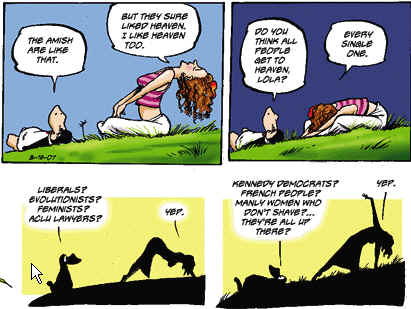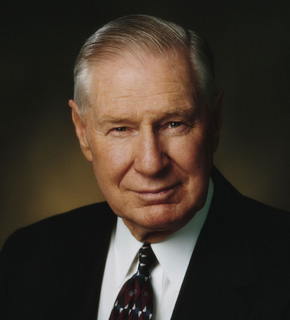As I’ve mentioned before, one of my sources of both frustration and amusement during my 40 years as a Latter-day Saint has been the sheer number of people who either misunderstand or deliberately misrepresent LDS history, beliefs and practices. So it is always a delight to run across a well-written article by someone outside the LDS Church who not only under understands LDS culture and doctrine, but who provides new insights.
Such an article is “A Mormon President? The LDS Difference“, written by Laurie Maffly-Kipp and published in The Christian Century. Maffly-Kipp is Associate Professor of Religious Studies at the University of North Carolina (Chapel Hill), and one of her areas of specialty is Mormonism. She clearly has done her homework; I’ve never seen someone outside the LDS Church (or few within it) so clearly articulate the balance of authority and independence within the Church:
Yes, the prophet can receive revelation. But this power is couched within a set of concentric circles of revelation and authority: the prophet receives revelation for the church, bishops receive revelation pertaining to their wards (local churches), and fathers and mothers receive revelation relating to their families. Most important, Mormons—like Protestants—attach great importance to the agency of the individual believer, who is expected to pray and receive guidance for herself. This set of interconnected responsibilities makes for clear lines of authority, to be sure—few agencies are as efficient as a local Mormon ward in action—but it also means that leaders cannot, in theory, overstep the bounds of the authority bestowed on them by virtue of their office.
In practice, then, LDS religious authority is diffused and regulated in quite orderly ways; indeed, one might say that this flow is both more controlled than in many Protestant churches and more democratically distributed than in Roman Catholicism. Mormons are taught from a very young age that their purpose in life is to exercise their own spiritual agency and to maintain a right relationship with God. The church hierarchy, of course, has a major role in facilitating that growth, but not the only role. Higher education is valued for both men and women, regardless of one’s career path. Healthy living and moral values are extolled not simply as exercises in discipline, but as keys to individual progress. Considerable emphasis, in other words, is placed on the individual cultivation of personal agency, a fact that may help explain the resounding business success of someone like Mitt Romney.
Nor do LDS Church members in good standing bow to church officials at every point; the authority of many church teachings is, in fact, somewhat ambiguous. There are a number of incontrovertible teachings, of course (such as: Joseph Smith was a prophet; sex before marriage is forbidden), but these are surprisingly few in number. Many other decisions are left to the dictates of individual conscience. One need only ask 10 church members about whether Mormons are allowed to drink caffeinated soft drinks to encounter a wide range of interpretations.
I strongly recommend the article, and I plan to keep a look out for other articles and books by Maffly-Kipp. ..bruce..


